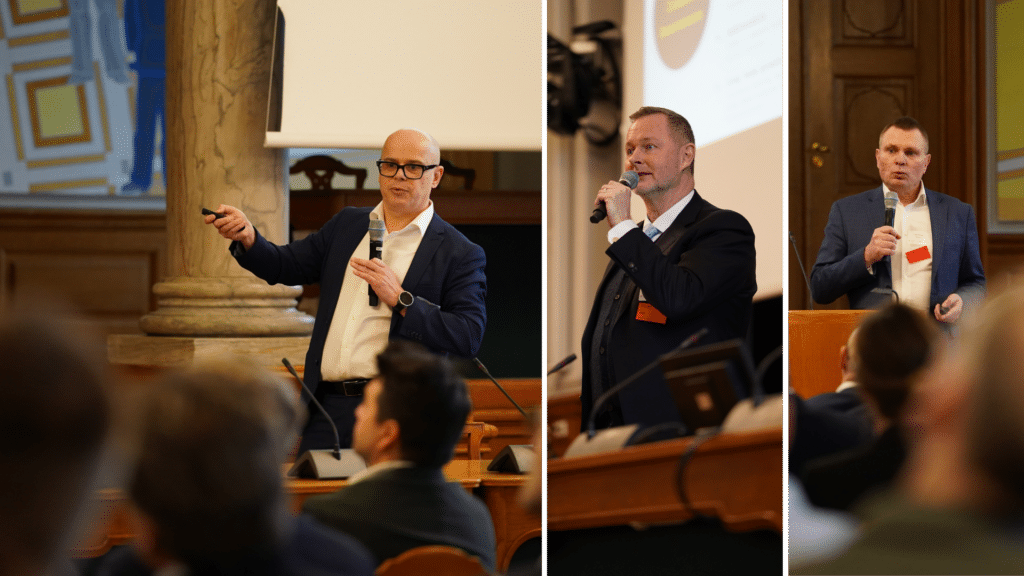The satellite connection is established — what are we waiting for?
The Danish space industry is growing rapidly, but are the opportunities being fully utilized? At a mini-conference at Christiansborg on February 10th, 2025, members of The Danish Parliament, experts, and space companies gathered to discuss how Danish satellite technology can contribute to Arctic security and surveillance.
Trine Reinholt Andersen, Marketing & Communication, Space Connect North
On February 10, 2024, a group of Danish space companies, researchers, and experts gathered in at Christiansborg to discuss how Danish space technology can support the government’s and Parliament’s ambition to strengthen surveillance and security in the Arctic. The mini-conference, organized by Space Connect North in collaboration with Sternula, featured a series of presentations from leading players in the Danish space industry.
A Danish space industry on the rise
The conference was opened by Claus Beck Christensen, Communications Director at Gatehouse Satcom, who introduced Space Connect North (SCN) – Denmark’s new space cluster based in Northern Jutland. The aim of SCN is to bring together industry, research institutions, and public stakeholders to strengthen space research, talent and technology development, as well as to create growth opportunities and collaborative projects across sectors. At the conference, Claus Beck highlighted, among other things, how SCN’s members can help enhance Denmark’s strategic position in the Arctic through established international partnerships and innovative satellite technology.

The role of technology in the Arctic of the future
Professor Petar Popovski from Aalborg University spoke about the university’s role in the development of mobile communication from 1G to 6G, as well as its work on CubeSat development over more than 20 years. He emphasized that future 6G technology will have a significantly increased satellite component, which will enable new AI-based applications in space.
Carsten Drachmann, CEO of GomSpace, pointed out that while Denmark has an established space industry, Danish authorities are not sufficiently leveraging the national expertise already available. In his presentation, Carsten Drachmann also shared GomSpace’s experiences from a previous collaboration with the Danish Armed Forces and called for investment in concrete satellite solutions for Arctic surveillance.
Lars Moltsen, CEO of Sternula, presented Denmark’s strong position within AIS 2.0 technology, which enables two-way satellite data communication with higher data security and faster connections. In 2023, Sternula became the world’s first AIS 2.0 satellite operator and sees great potential in applying the technology for maritime surveillance in the Arctic.

5G, 6G and private investments
Jane Rygaard from Nokia spoke about satellite-based 5G and 6G, which are essential for communication in the Arctic. Nokia Aalborg plays a central role in the international standardization of “non-terrestrial networks,” laying the foundation for more global collaborations within the Danish space industry.
Niels Vejrup Carlsen from the newly established venture fund Final Frontier emphasized the importance of private capital to complement public investments in the space sector. He warned that rising defense budgets risk being used inefficiently if smaller and newer companies are not given access to contracts and funding.
Support for space startups
One of the cornerstones of a thriving ecosystem is innovation and startups. Sune Nordentoft from ESA BIC Denmark spoke about the incubator network, which has so far helped 41 Danish space startups (as of January 2025) with funding and mentoring. ESA BIC plays an important role in ensuring that the next generation of Danish space companies establish themselves in the industry.

What’s next, Denmark?
The conference was summarized and concluded with a panel debate moderated by the conference host Mohammad Rona, a member of The Danish Parliament for the Moderates. The discussion focused on four key areas of action to ensure that Denmark strengthens its space capabilities:
- The government and politicians need to gain a better understanding of the potential of Danish space technology through close dialogue with the industry.
- The defense procurement policy should be adjusted so that Danish space solutions can be integrated into defense and surveillance projects.
- Companies should present concrete proposals for space projects to the authorities.
- Organizations such as Space Connect North and Space Denmark should consolidate and communicate the opportunities of the Danish space industry.
The conference demonstrated that Denmark has both the technologies and expertise to play a central role in the Arctic, but political insight and action, combined with greater investments, are necessary to realize this potential.
Did you miss the conference?
See highlights and a series of interviews below:
👉🏻 Remember to follow Space Connect North on LinkedIn
👉🏻 View other news from Space Connect North
See also
Let’s get you
into space
Let Space Connect North assist you in meeting your needs. We can arrange a full day of meetings or demonstrations with selected members, showcasing what Northern Denmark has to offer.
Pursuing a career in space? Reach out, and let us help make your dreams come true.
